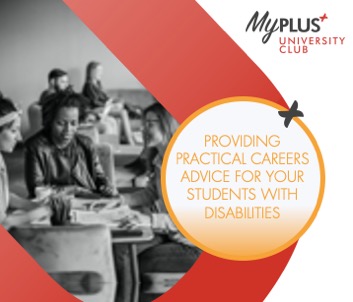In this guest blog, we hear from MyPlus Universities’ Club member Lucy Crittenden from Birkbeck University Careers and Employability team discussing the benefits of collaboration with Student Services to support disabled students navigate the employment landscape.
Birkbeck attracts a much larger proportion of disabled students than the university sector overall. More than 23% of our full-time entrants have told us about a disability compared to 13% in the sector (HESA 2017/18 data).
Data from the Destination of Leavers from Higher Education Survey (Office for Students 2018) showed that six months after graduation, those declaring a disability were less likely to be in full time employment than those who did not. This is a sector wide issue, but particularly affects our mature students who often have multiple and more complex disabilities and are often long-term unemployed.
To address this, we developed the Ability Programme in collaboration with our Disability & Dyslexia (DDS) and Mental Health Advisory (MHAS) Services. Through a series of bespoke workshops alongside paid work placements, Ability helps disabled students navigate the ever-changing landscape of work and connect with disability confident employers.
Why did we feel it was important to collaborate?
With the above employment gap, continuing changes in student expectations from an HE provider and Office for Students (OFS) requirements, we knew it was important to ensure that we were providing a fully joined up service to support the entire journey of disabled students, both at Birkbeck and beyond. This could only be done by collaborating with the services that actively deal with disabled students on a day to day basis to learn from their expertise, experience and connections and get their support in actively promoting the programme.
How have we worked together?
- Regular meetings so that we are all aware of what each service is aiming to achieve, what activities are running, make sure we understand what we can provide to students and keep each other updated.
- Co-run workshops on topics such as openness statements and services available to students.
- Included members of DDS and MHAS in our employer roundtable event to share knowledge and best practice.
- Student referrals from DDS and MHAS to Birkbeck Futures where students could benefit from careers related support.
- Birkbeck Futures refers students to DDS and MHAS where support outside of careers is required and sign post services to students more generally.
- DDS shares information on the Ability programme, events etc with both current and prospective students.
- Working together to understand the adjustments and support required for students, both for workshops and work placements.
What advice would we give on how to build those relationships?
We had an advantage at Birkbeck in that our Student Services teams have traditionally had close relationships with each other, but some things we would suggest are:
- Get buy in from your senior leadership so that they support what you are doing and collaboration is encouraged.
- Understand what the services are doing and how that can link with student career journeys.
- Share your plans and ask for input and suggestions from the other services. Show them what you are planning/doing and the potential impact (or impact if it something you are already running).
- Services are likely to be stretched, especially at the current time, so identify ways in which you can collaborate without adding to workload. For example, we create content for DDS and MHAS to share on our behalf as part of their normal communications.
- Demonstrate that working together will not only benefit the students but also the HE institute as a whole, for example when recruiting students.
- Find people in the services who ‘get’ what you are trying to do and encourage them to get involved. Start small and build up once you have someone who can champion what you are doing.
- Invite people from the services to attend activities you are running so that they can see what you are offering.
We are still learning and will continually review our initiatives and ways of collaborating, but we would be more than happy to speak to anyone who would like to hear more about our journey. We would also love to collaborate with more institutions to address the issues faced by disabled students. You can get in touch with Lucy Crittenden and Anna Gordon at employability@bbk.ac.uk
Birkbeck Futures is a one-stop service that combines the Careers Service, Enterprise Pathways and Birkbeck Talent to support Birkbeck students and graduates in their future lives.

